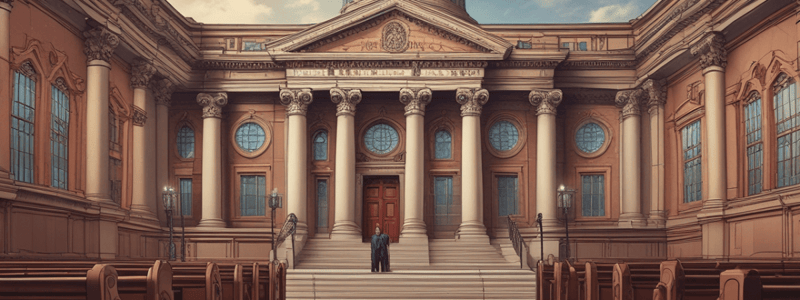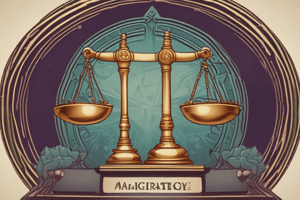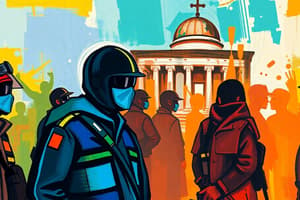Podcast
Questions and Answers
What are the duties of the Chief Magistrate in the District Courts?
What are the duties of the Chief Magistrate in the District Courts?
Posts magistrates, allocates duties, makes reports, and has disciplinary powers
Who assists the Chief Magistrate in his role and what are their responsibilities?
Who assists the Chief Magistrate in his role and what are their responsibilities?
The Deputy Chief Magistrate; ex-officio member of all District Courts with jurisdiction equivalent to magistrate grade V.
What powers and responsibilities does a Senior Provincial Magistrate have?
What powers and responsibilities does a Senior Provincial Magistrate have?
Judicial and non-judicial powers delegated by service determinations or the Judicial and Legal Services Commission.
How are Village Courts established and who are the typical members?
How are Village Courts established and who are the typical members?
Under what circumstances can a Village Court be constituted by only one village magistrate?
Under what circumstances can a Village Court be constituted by only one village magistrate?
What are the roles and responsibilities of the Chief Magistrate in relation to the District Courts?
What are the roles and responsibilities of the Chief Magistrate in relation to the District Courts?
How is a District Court normally constituted in terms of the number of magistrates?
How is a District Court normally constituted in terms of the number of magistrates?
What is the jurisdiction of District Courts in terms of geographical coverage?
What is the jurisdiction of District Courts in terms of geographical coverage?
What distinguishes the limited jurisdiction of District Courts in both criminal and civil matters?
What distinguishes the limited jurisdiction of District Courts in both criminal and civil matters?
How are magistrates organized and managed within the District Courts system?
How are magistrates organized and managed within the District Courts system?
What types of cases do District Courts not have jurisdiction over?
What types of cases do District Courts not have jurisdiction over?
To where do appeals from the District Court lie?
To where do appeals from the District Court lie?
What role do District Court magistrates play in relation to Village Courts?
What role do District Court magistrates play in relation to Village Courts?
What jurisdiction do Local Courts have?
What jurisdiction do Local Courts have?
Who constitutes the Magisterial Service in the District Court?
Who constitutes the Magisterial Service in the District Court?
What is the first step a Village Court must take in any dispute?
What is the first step a Village Court must take in any dispute?
In what circumstances can a Village Court adjourn ongoing proceedings?
In what circumstances can a Village Court adjourn ongoing proceedings?
Who supervises Village Courts?
Who supervises Village Courts?
What is the role of lawyers in proceedings before Village Courts?
What is the role of lawyers in proceedings before Village Courts?
Who can initiate an appeal from a decision of a Village Court?
Who can initiate an appeal from a decision of a Village Court?
What types of offences can District Courts try in criminal matters?
What types of offences can District Courts try in criminal matters?
What are hybrid offences in the context of District Courts?
What are hybrid offences in the context of District Courts?
What are some examples of indictable offences that are reserved for the National Court and cannot be tried summarily in the District?
What are some examples of indictable offences that are reserved for the National Court and cannot be tried summarily in the District?
What is the civil jurisdiction of District Courts over personal actions at law or in equity?
What is the civil jurisdiction of District Courts over personal actions at law or in equity?
What is the main role of a Principal Magistrate in the District Court?
What is the main role of a Principal Magistrate in the District Court?
What types of cases does the National Court usually hear in civil matters?
What types of cases does the National Court usually hear in civil matters?
In addition to hearing appeals from District Courts, which other bodies or tribunals can the National Court hear appeals from?
In addition to hearing appeals from District Courts, which other bodies or tribunals can the National Court hear appeals from?
What inherent power does the National Court have in relation to the Constitution?
What inherent power does the National Court have in relation to the Constitution?
What areas of civil matters have exclusive jurisdiction in the National Court?
What areas of civil matters have exclusive jurisdiction in the National Court?
Under what legislation are District Courts established?
Under what legislation are District Courts established?
Who presides over District Courts?
Who presides over District Courts?
What is the primary role of a Senior Provincial Magistrate?
What is the primary role of a Senior Provincial Magistrate?
What types of cases do District Courts typically handle?
What types of cases do District Courts typically handle?
What is the key responsibility of the Chief Magistrate in relation to District Courts?
What is the key responsibility of the Chief Magistrate in relation to District Courts?
How should one consult for the practice and procedure in the National Court?
How should one consult for the practice and procedure in the National Court?
What is the role of a coroner in a proceeding where questions of customary law arise?
What is the role of a coroner in a proceeding where questions of customary law arise?
What jurisdiction and authority do District officers have as coroners throughout the country?
What jurisdiction and authority do District officers have as coroners throughout the country?
What are the duties/functions of a coroner in an official inquiry or inquest?
What are the duties/functions of a coroner in an official inquiry or inquest?
What powers does a coroner have during an inquest?
What powers does a coroner have during an inquest?
What powers are granted to a coroner for an inquest related to indictable offences?
What powers are granted to a coroner for an inquest related to indictable offences?
Flashcards are hidden until you start studying




